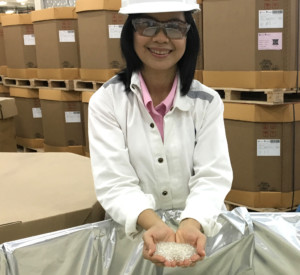The Netherlands to ban oxo-degradable plastics: After France and Spain implemented actions in 2017 to limit the production, distribution, sale, provision and utilization of packaging or bags made from oxo-degradable plastics – conventional plastics that falsely claim to biodegrade – the Netherlands now, too, announced plans for a complete ban of oxo-degradable plastics. “A ban on oxo-plastics that fall apart into microplastics is an important step in the fight against pollution,” said Suzanne Kröger, Member of the Dutch Parliament and GroenLink, the party that submitted the proposal in the Lower House. The announcement followed a report by the European Commission earlier in January this year announcing plans to restrict the use of these materials in Europe.
100% renewable and compostable tea bags: Tea is the most consumed beverage after water in the UK. PG tips, part of Unilever and UK’s favourite tea bag with 9 billion tea bags made every year, is now working to make all tea bags from 100% plant-based material by the end of the year. Most tea bags are still made mostly with paper and a small amount of polypropylene (PP) used to seal the tea bag. The new tea bags will be made using a new material made from cornstarch that is compostable. Mike Falconer Hall, Organics Programme Manager, WRAP, says: „If you have a food waste recycling collection in your area, you can put your used tea bags in there. Alternatively, you could pop it into your home composter, however, our climate means it can take a long time to break down, so you may want to sieve out the leftover part of your tea bag and discard it or dig in with the compost.”
Bio-on launches PHA solution for the controlled-release of fertilizers: The researchers of the Italian company Bio-on have developed a solution for the controlled release of Urea fertilisers, an enormous market with global annual production of 180 million tons and 4% annual growth. Urea fertiliser is usually sold in white crystals, pellets or granules. It is a very concentrated nitrogen-containing feed that is highly water-soluble and rapidly disperses in the subsoil. The new technology called U-COAT made from PHA coats the UREA granule which will then release the fertiliser into the soil in a controlled way as and when required, leaving no trace and protecting the fertiliser from being washed away by rainfall. This will subsequently reduce the quantities of urea used in the soil and eliminate any excess, with a reduction in costs and environmental impact on the subsoil.
 Total Corbion PLA announces successful start-up of pilot plant in Rayong, Thailand: Total Corbion PLA, a global technology leader in Poly Lactic Acid (PLA) and lactide monomers, announced that it has successfully started up its 1 kTpa PLA pilot plant in Rayong, Thailand. “With the successful start-up of the pilot plant, Luminy® PLA from the pilot plant is now available for customer sampling”, says Senior Marketing Director, Francois de Bie. In addition, the pilot plant is being used to train operators and to get a head start on the required product certifications and regulatory needs. In future, Total Corbion PLA will also be able to use the pilot plant for product development. On the same site, Total Corbion PLA’s Lactide plant is being expanded to 100 kTpa and a 75 kTpa PLA polymerization plant is under construction.
Total Corbion PLA announces successful start-up of pilot plant in Rayong, Thailand: Total Corbion PLA, a global technology leader in Poly Lactic Acid (PLA) and lactide monomers, announced that it has successfully started up its 1 kTpa PLA pilot plant in Rayong, Thailand. “With the successful start-up of the pilot plant, Luminy® PLA from the pilot plant is now available for customer sampling”, says Senior Marketing Director, Francois de Bie. In addition, the pilot plant is being used to train operators and to get a head start on the required product certifications and regulatory needs. In future, Total Corbion PLA will also be able to use the pilot plant for product development. On the same site, Total Corbion PLA’s Lactide plant is being expanded to 100 kTpa and a 75 kTpa PLA polymerization plant is under construction.Retail chain SPAR introduces bio-based reusable shopping bags: SPAR Austria announced to introduce reusable bags made from 100% renewable resources that can hold heavy loads, be reused multiple times, and that are compostable at the end of their useful life. Last year alone, the retailer sold 8% more reusable bags than in the previous year. As a next step, SPAR together with the bioplastics experts from the Austrian weforyou Group developed a reusable bag made from PLA fleece derived from GMO-free sugarcane produced in Thailand. The bags are tested according to the European standard EN 13432 for industrially compostable plastic packaging and have been certified with the labels Seedling and OK Compost.